Last updated
17 December 2015
Sydney Wooderson MBE
|
Centenary of birth of Sydney Wooderson MBE
100 years ago on 30 August 1914, one of the UK’s
greatest ever athletes was born. His achievements during his Athletics
career were massive and but for WW2, its very likely he would have won
Olympic Gold in the 1940 and 1944 Games which of course never took
place. For the politicians who advocate boycotts, the lessons from this
are very strong! But for the war, Sydney might even have been the first
to break 4 minutes for the mile. Nonetheless, Sydney was an Olympian,
representing GB at the Berlin Games in 1936. Unfortunately he had
injured himself while out walking just before the Games and so did
himself no justice, not even finishing in his heat. He won Gold at the
Paris Europeans in 1938 at 1500m and also in 1946 at 5000m in Oslo.
Sydney won silver in the Mile at the London Empire Games in 1934 but
missed the Sydney Empire games in 1938 as he was taking his law exams.
He set World records in 1937, 1938 and 1939 at the Mile, Half Mile (and
800m) and also at the Three Quarters of a Mile. 4.06.4, 1.48.4 (1.49.2
for 880), and 2.59.5 were his World record marks and in 1945 he improved
his mile time to 4.04.2 in Stockholm. He had to wait until he was over
85 for his MBE, the result of a lengthy campaign by his friends.
Arguably his greatest Athletic achievement was
winning the ‘National’ at Sheffield in 1948 leading Blackheath to their
first ever National team medals. It took that great Club until 1986 to
match that achievement. The photos from Sheffield show just how much he
wanted this win, what he put himself through and his absolute
determination to win. He decided not to run in the 1948 Olympic Games as
he took the view that he could only properly prepare for either the
‘National’ or the Olympics and he chose an event that had massive
significance at the time. Whether, by effectively turning his back on
the Olympics, he lost the opportunity to light the flame is open to
conjecture. He was our greatest ever athlete and deliberately choosing
not to participate in the Olympics probably lost him some support. But
Sir Roger Bannister is firmly of the view that Sydney should have had
this honour.
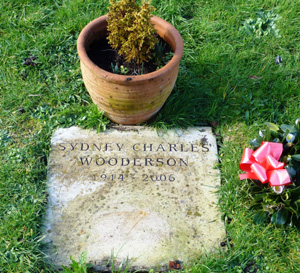 His
gravestone in Wareham, Dorset is typically modest, makes no mention of
his MBE or his prowess and status as one of the greatest athletes of all
time. But his wife and family never knew him as the superstar athlete
and a wonderful poem written for his funeral spoke of the person in the
photo on the wall that nobody really knew. His
gravestone in Wareham, Dorset is typically modest, makes no mention of
his MBE or his prowess and status as one of the greatest athletes of all
time. But his wife and family never knew him as the superstar athlete
and a wonderful poem written for his funeral spoke of the person in the
photo on the wall that nobody really knew.
He was twice President of Blackheath Harriers, the
second time during their centenary year in 1969. He turned to coaching
after effectively hanging up his spikes after the 1949 National where he
finished 45th, 4 places behind 1948 Olympian and clubmate Jack Braughton.
Earlier Sydney had finished a creditable 14th in the 1949 Southern, an
event he had won in Olympic year.
His 80th birthday was celebrated in great style at
the Blackheath clubhouse, now renamed the Sydney Wooderson Centre. This
renaming took place after the Memorial Service in his honour that was
held in 2007. A great event attended by over two dozen Internationals
and over a dozen Olympians, including Bill Nankeville, Doug Murray, John
Parlett, Eric Shirley and Paul Nihill. Some wonderful messages were
received and read out. These were from the likes of Lynn Davies, Steve
Ovett, Brendan Foster, Tim Hutchings and David Coleman.
The connection with David Coleman, I have written
about before and Sydney was David’s all time athletics hero something he
told me when I was trying to get David to come to Blackheath for their
annual Club dinner. David told me of how he took the Manchester Mile
trophy to bed with him after his win at Fallowfield in 1949. All because
it had his hero’s name on it as first winner in 1943. In the great
Olympic arena in the sky they will both be pleased that the Manchester
Mile has made a welcome return to the Athletics calendar. David, donning
his journalist’s hat, honed at the Stockport Express and at the BBC,
would most certainly be asking Sydney about his experiences and his
thoughts on the controversy surrounding the lighting of the 1948 Olympic
flame. He would also be querying why it took so long for Sydney to
receive an MBE and whether Sydney thought that but for the War he might
have been the first to break 4 minutes for the mile. David, I’m sure,
would also express his annoyance that Sydney was ignored on SPOTY
(Sports Personality of the Year) and left off the list of prominent
Sports people who had died in the previous year. Can well imagine David
shouting at the TV during this 2007 programme. David himself will of
course not be ignored in the 2014 programme and wouldn’t it be nice if,
at the same time, they could give a mention to his all time hero.
Possibly David could get a message through to that nice young man Gary
who used to score a lot of goals and who was suitably apologetic when
the omission was pointed out to him.
Sydney’s legacy is well preserved and every year
very close to the anniversary of the 800m World record an 800m race is
held as part of the BMC meeting at Cambridge Harriers’ HQ. It is a high
quality affair with a decent cash prize for the winner and a bonus
should the winner better Sydney’s World record time. A few years ago the
winner missed Sydney’s mark by just .3 of a second, probably the most
expensive .3 that athlete will ever have! This year there will also be a
special centenary bonus of £100 for the winner.
His memory lives on. He was the greatest ever
‘Heathen’ and as the song goes “his soul goes marching on”!
Mike Martineau
Past President, Blackheath Harriers
4 August 2014
This year's event is on Wednesday,
20th August 2014 at about 8.45pm in the
BMC meeting at Sutcliffe Park. Hopefully we might then get some B&B
members there. Parking can be difficult so allow spare time.

|
13-10-09
From the England Athletics website. Further
details of all recipients can be found at
www.englandathletics.org
Hall of Fame - Inductees 2009
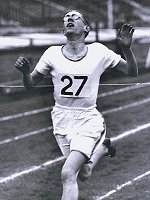 Sydney Wooderson Sydney Wooderson
Wooderson,
a diminutive and bespectacled solicitor, was an unlikely looking
champion athlete but with his deceptively long stride, big
heart, deadly sprint and genuine modesty he attracted much
affection and admiration from the British public of the 1930s
and 1940s.
It was in 1937 that Wooderson became a legendary figure by
setting a world mile record of 4:06.4 off scratch in a handicap
race at Motspur Park in Surrey. He had merely been aiming to
better his British record of 4:10.8! The following year, in
another Motspur Park handicap event, he broke two world records
in one race, clocking 1:48.4 for 800m en route to 1:49.2 for 880
yards.
In 1946 he moved up to 5000m and proceeded to capture the
European title in 14:08.6, the world's second fastest ever time
and 23 sec inside the British record. In March 1948 this
remarkable man who had at one time or another been the best in
the world at 800m, mile and 5000m, became English 10 miles cross
country champion!
|
| 10-09-07
Over 60 members, spouses and partners (along with
lots of guests) attended the
Service for Sydney Wooderson on Saturday 8 September 2007.
The Church, and Club afterwards, was crowded for
an event that enabled the Club and the Sport to join with his family and
celebrate in a very appropriate manner the life of our most famous son.
Over 20 members had a part to play in this event. It was a team exercise
and showed the Club at its very best.
All age groups came together to make sure that the
day was a success. To all those who attended and to all those who
helped, a big "Thank You". The calls and reaction since Saturday
indicates that we all have a lot to be proud of. Well done!
Mike Martineau
These photos from David Johnson
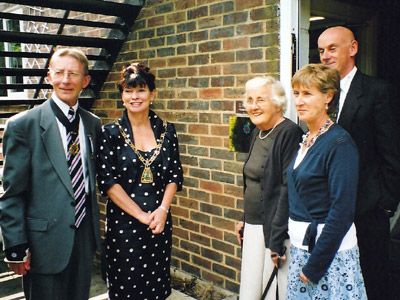
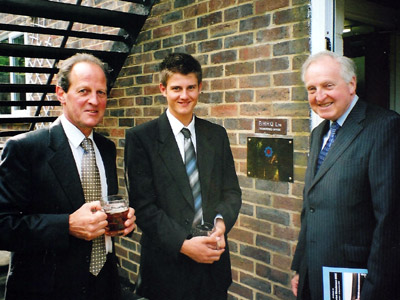
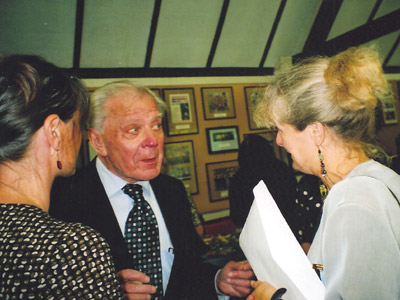
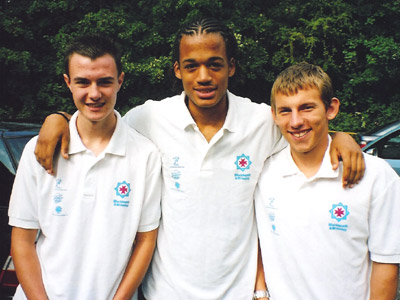
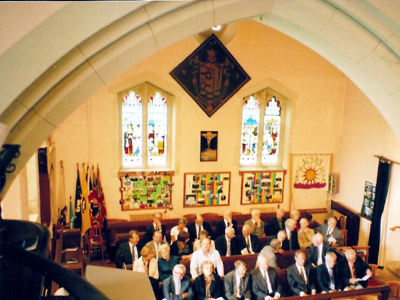
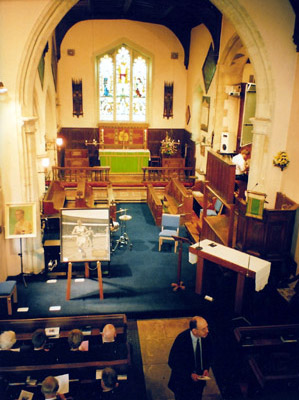
|
|
Soon
after joining Blackheath Harriers, Sydney Wooderson’s outstanding talent
became obvious, and under the guidance of his trainer, Albert Hill (the former
Olympic 800 & 1500 metres champion), he was rising to great heights both on
the Track and over the ‘Country. 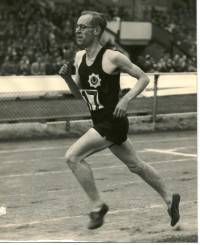
Sydney’s
peak achievements can best be summarized as world record holder at 880 yards and
1 mile, 5000 metres European champion and National Cross-Country champion in
1948. He had epic meetings with the Belgian Slykhuis, the Swedes Arne Anderson
and Gundar Haegg and New Zealand’s Jack Lovelock, to mention a few of the
greats – all meetings at which he was rarely beaten.
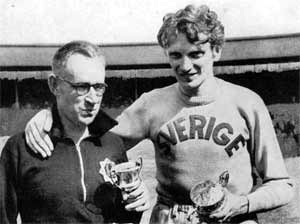 arne-andersson arne-andersson
In
no way did all this success detract from Sydney’s love for Blackheath
Harriers, for whom he served as President in 1946 and Centenary President in
1969. He was deservedly awarded an MBE in the 2000 Birthday Honours List for
services to Blackheath Harriers and athletics.
Sydney
was a quiet, retiring and unassuming solicitor’s clerk. A truly great
Blackheath Harrier and amateur sportsman, whose very qualities endear him to all
who had the privilege to know him.
Sydney died on 21 December 2006
aged 92 years.
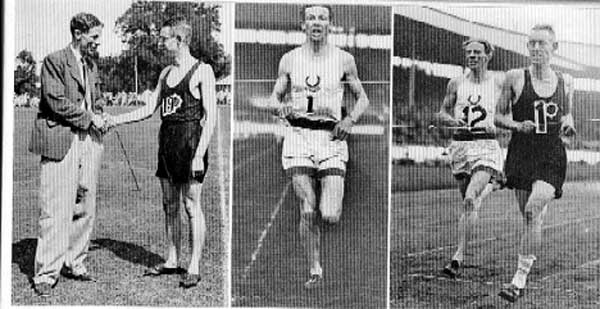
Sydney, greeting and beating Lovelock
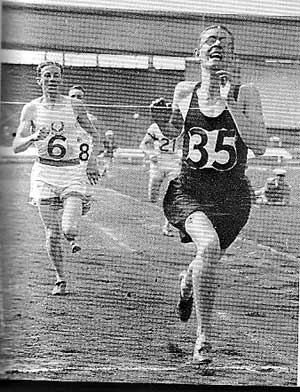
Sydney beating Lovelock (again?) |
|
13-01-07
Letter of the week in the 11 January
2007 edition of Athletics Weekly
A true legend
SYDNEY WOODERSON, who died just before Christmas, was arguably the
greatest athlete to have ever worn a British vest. Injury in 1936 and
war during the two subsequent Olympics denied him chances to win the
medals his standing in world athletics deserved and the attention that
would still be given to such performances today. Obituaries elsewhere
will eulogise on his performances on the track, which I was never
fortunate enough to have seen. My memories of him were in other spheres.
We first met when I interviewed him about his coach, Albert Hill.
Throughout the course of our time together he talked enthusiastically
about others who had influenced his athletics career but whenever I
tried to steer the conversation around to his own achievements he
remained charming but was noticeably reluctant to talk about himself.
Equally, he only accepted an honorary award from Roehampton University
when he was assured that he would not have to give an acceptance speech.
Though shy and unassuming in public, on the track he dominated his
events like few others have, either before or since - or for so long. He
spent most of his leave during the war racing around the country. His
status by then was so iconic that the author Richard Holt in Sport and
the British said the "small, thin, dowdy; bespectacled man in
Blackheath's all-black strip represented the courage and endurance that
defeated Hitler's· armies".
Even after the privations of war and serious illness he managed to
run faster than ever and win major races - and it was not unknown for
sell-out crowds to be joined by others who broke into grounds simply to
see the little man run.
To me he was the perfect athlete. The most telling comment he made
came when I asked him if he regretted not being an athlete today, as his
performances would have made him very rich. Without hesitation he
responded that he loved his time in the sport; it was a hobby,
relaxation and highly enjoyable. Today, he commented, he would be a
full-time athlete; it would be his job and he would have to get out of
bed in the morning and run as work. He would have lost much of the fun.
No, he regretted nothing.
We will never see his like again. The era of the dedicated amateur is
long past. He may have died but he has been a legend for so long that it
seems he has not, and never will, leave us. Anybody who met him will
have fond memories of a great, great man.
Dr Greg Moon, London NW5
|
|
12-01-07

First published by
Athletics Weekly 20 December 1995
When Athletics Weekly was starting
out,
Sydney Wooderson was a national hero.
Now he's a legend
Words: Trevor Frecknall
Accidental Hero
JUST ABOUT THE MOST enduring mystery in postwar British athletics is
why Sydney Wooderson has never been knighted.
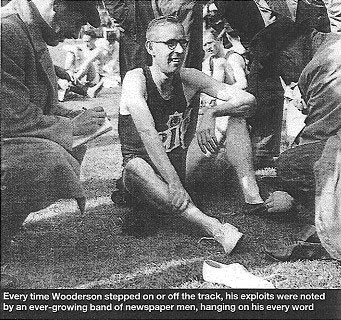 He
so typified the stature and spirit of war-torn Britain, it was taken for
granted by his friends and admirers that royal recognition would follow. He
so typified the stature and spirit of war-torn Britain, it was taken for
granted by his friends and admirers that royal recognition would follow.
They're still waiting, while Wooderson spends his 82nd year in contented
retirement with his wife in Dorset.
His eyesight, never the best, is "not at all good" now. But his wiryness
- at 5ft 6in, he weighed in at 125lb for his best races - remains such
that he still goes for a daily constitutional of two to two-and-a-half
miles because "there's nothing like it to clear the mind."
And he recalls the high and low points of 50 and 60 years ago as clearly
as if they happened yesterday ... but with a politeness and deference
that belongs entirely to yesteryear.
Wooderson is almost apologetic about how little he trained to reach his
pinnacles. "I did very much less than athletes today," he begins. "Most
people would be shocked at the little amount of training I did.
“I was working, you see. It was in an office, pretty much nine to five,
but it was not like today where athletes can fly over to Australia for
the winter.
"I wouldn't have wanted to be a full-time athlete - though I suppose, if
I was running today, I would have done what was expected of me."
As it was, he trained on four or five nights a week, after work as a
solicitor in his native London.
He would warm up with a three miles jog. Then would come a set piece - a
half-mile or three-quarter mile or one-and-a-half mile hard run, rounded
off with a couple of miles jogged warm-down.
"I varied the set piece each time," he recalls. "But that was my
training."
More confusingly for today's athletes , .who are being told to work more
intensely, Wooderson reveals he had two lengthy rest periods each year.
"I would take a month's break after the end of the track season. Then I
did some cross country up to Christmas, running at half speed or three
quarter speed.
"From Christmas I had another six weeks break before beginning to
prepare for the new track season.
Could this be where today's middle distance runners go wrong? "I
hesitate to say it," says this quietly-spoken gentleman, "but it's my
opinion that they don't rest enough. It's slightly different, of course,
because they are full-time athletes, whereas I had a full-time job."
Does he envy the full-time athletes? "Oh no! I wouldn't like to do their
hard work. It's too much pressure, I think.
"Those Grand Prix meetings, for example. The athletes have to do them.
Once they are involved, it seems they have to do as they are told."
Stories are legion of Wooderson adhering to his amateur status by even
turning down travelling expenses, and he almost shudders to recall:
"There were two races when I was offered money. I was actually sent £12
after a race in Scotland. I sent it back."
His most extravagant reward? "I ran at a meeting at Derby and won a
Crown Derby bowl. We still have it." He pauses, as if a novel thought
occurs: "I bet that's worth something now"
Not worth nearly as much as his memories ... memories of a world that
turned upside down at the very time when he would have been reaching the
peak of his athletic prowess.
Not that he blames Adolf Hitler for robbing him of the chance to become
the first man to run a mile in less than four minutes.
"Obviously I could have gone faster if I had been able to continue
training," he says.
"Perhaps 4:01. something like that," he adds hastily, lest one begins to
believe he envies Sir Roger Bannister's indelible place in history.
Doesn't Wooderson honestly believe he could have threatened the magical
four-minute mark? "No, I don't really think so, I think it's a matter of
progression.
"I did 4:06 before the War and 4:04 after the war.''
The 4:06 - to be precise, his world record 4:06.4 - came on August 28,
1937 in a specially arranged handicap race in London's Motspur Park that
was so well publicised it attracted 3000 spectators.
Triumphs and pain
The following year, in Paris, he easily won the European I500m title in
3:53.6. These triumphs were sandwiched by his two greatest
disappointments.
His love of walking in the countryside forced him to limp out of the
1936 Olympic 1500m heats in Berlin.
"I twisted my ankle while out walking," he says. "I was very prone to
that kind of thing because it was very easy to keep on my toes. I always
did quite a bit of walking every weekend. I liked to get out in the
country, away from the house."
Despite the injury, he travelled to Berlin - literally, an innocent
abroad. '"We were all housed in a village and it was quite enjoyable,
really. I didn't get the impression of Hitler and the Nazis being
terrible - but, then, they didn't want us to get that impression, did
they?"
More remarkably, given his shyness, he recalls: "I chatted a lot to one
of the Finnish 10,000m runners can't remember his name, though."
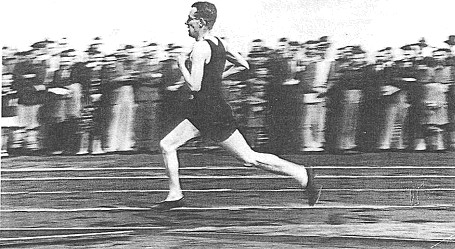
He may not have looked like an international athlete,
but Wooderson could move with speed
"There were two races when I was offered money. I
was actually
sent £12 after a race in Scotland. I sent it back."
But Wooderson's other great disappointment resulted from his unease
among strangers - when he travelled to the USA for the Princeton
Invitational Mile in 1939.
"I hoped to win it but my main worry was that I was not too used to
talking to many people, or being away from home." He finished fifth in a
race won by the USA's own Charles Fenke in 4:11.0 - Wooderson's only
major defeat in three years.
The performance he rates as his greatest ended in defeat, too, but he
still recalls it with considerable pride.
It came on September 9, 1945 in Gothenburg in Sweden, which had remained
neutral through the Second World War.
While Wooderson laboured all hours in first the Pioneer Corps and then
the REME from 1940-45 (because his C3 eye sight prevented him fighting
on the front line), Swedes Arne Andersson and Gunder Haegg took slices
off his world record.
At the age of 31, after very little training, Wooderson ran his
fastest-ever 1500m (3:48.4) on his way to a mile PB of 4:04.2 behind the
4:03.8 of Andersson.
"It was better than my world record," asserts Wooderson. "Remember, I
hadn't been able to train during the War. It was a remarkable thing
after one summer's training and only three real races."
It was, too. But, then, his entire athletics career was remarkable, not
only because he never actually looked like an elite athlete but also
because it all began by coincidence.
"My elder brother started running, and winning, school races and I just
sort of tagged along," he recalls. "Blackheath Harriers had a cross
country match with the school every year, and it was a natural
progression for me to join the club.
"It was just the fact that I liked running and I was determined to do
the best I could.
"Why could I run? It's one of those mysteries. "Why are people actors,
or singers, or dancers? Something draws them on ...
And does he have any regrets about the War so rudely interrupting his
progress. Handing accolades to Andersson and Haegg ... and Bannister?
He shrugs: "You hand the torch, so to speak, onto someone else."
And what of those still carrying the torch of hope that he may yet
become Sir Sydney "Oh, it's too late now, isn't it?"
Is it? Is it really?
Wooderson's heroes
Ask Sydney Wooderson to name the athlete who has impressed him
most during his lifetime, and he says: "Seb Coe, I suppose.
Holding world records for the half and the mile and winning
Olympic titles makes him the greatest Briton, don't you think?
"But otherwise I would say Jesse Owens (who won the 1936
Olympics l00m (10.3sec), 200m (20.7) and long jump (8.06m) as
well as a 4xl00m relay gold).
"I always thought he was the tops, probably because I was
younger when he ran. The easy way he sprinted was marvellous. "
|
SYDNEY WOODERSON
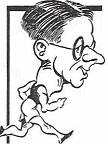 Born
in London on August 30,1914, he set a world record for the mile
4:06.4 in Motspur Park on August 28,1937, ran world records for
800m (1:48.4) an 880 yards (1:49.2) and won the European 1500m
title in 1938, added the European 5000m crown in 1946 (In
14:08.6, then the second fastest time in the world, a week short
of his 32nd birthday); and signed off by winning the English
National Cross Country Championship in 1948. Born
in London on August 30,1914, he set a world record for the mile
4:06.4 in Motspur Park on August 28,1937, ran world records for
800m (1:48.4) an 880 yards (1:49.2) and won the European 1500m
title in 1938, added the European 5000m crown in 1946 (In
14:08.6, then the second fastest time in the world, a week short
of his 32nd birthday); and signed off by winning the English
National Cross Country Championship in 1948. |
|
9-01-07
Photo and short article on Belgrave website. Match vs Bels
1941
http://www.belgraveharriers.com/back_track/bt_1941_rc_bel_v_black.htm
Obituary in The Herald
http://www.theherald.co.uk/features/78126.html
The lastword radio programme featuring reminiscences of
Sydney
http://www.bbc.co.uk/radio4/news/lastword.shtml
6-01-07
Sports Journalists
http://www.sportsjournalists.co.uk/blog/?p=395
The
Scotsman
http://news.scotsman.com/obituaries.cfm?id=1923662006
Entry in Wikipedia
http://en.wikipedia.org/wiki/Sydney_Wooderson
Buzzle
http://www.buzzle.com/articles/121921.html
3-01-07
Read The Independent
Obituary
http://news.independent.co.uk/people/obituaries/article2110290.ece
2-01-07
Read the New York Times
Obituary
http://www.nytimes.com/2007/01/02/sports/othersports/02wooderson.html?_r=1&_&oref=slogin
27-12-06
Read the Athletics Weekly
Obituary
http://www.athletics-weekly.com/newsarticle.php?id=126
27-12-06
Read the Times Obituary
http://www.timesonline.co.uk/article/0,,60-2516259.html
23-12-06
Read the Daily
Telegraph Obituary
http://www.telegraph.co.uk/news/main.jhtml?view=DETAILS&grid=&xml=/news/2006/12/23/db2301.xml
24-12-06
To: Mr Ken Daniel, President, the Blackheath & Bromley
Harriers AC
24th December 2006
Dear Ken,
It is with sadness that we have learnt of the passing of
Sydney Wooderson. Sydney will be remembered for his great athletic achievements
on the track and on the country, but throughout his distinguished running career
he considered himself a Heathen above all else. His devotion to your club was
exemplary, and remains a lasting inspiration to club athletes everywhere.
Would you please pass on our condolences to his family.
Kind regards,
Andrew Howey Chairman, the Tunbridge Wells Harriers
22-12-06
To John Baldwin
John,
Would you relay the commiserations of both
Newham & Essex Beagles (current National 6 and 12 stage Road Relay and
English Cross Country Relay champions) and England Athletics London
Region to the members of Blackheath and Bromley Harriers (via your
website) on the passing of such a great athlete and inspiration to many
generations of participants and supporters of the sport.
Best wishes.
Tony Shiret
Co-Chair, EA London Region.
|

|
|